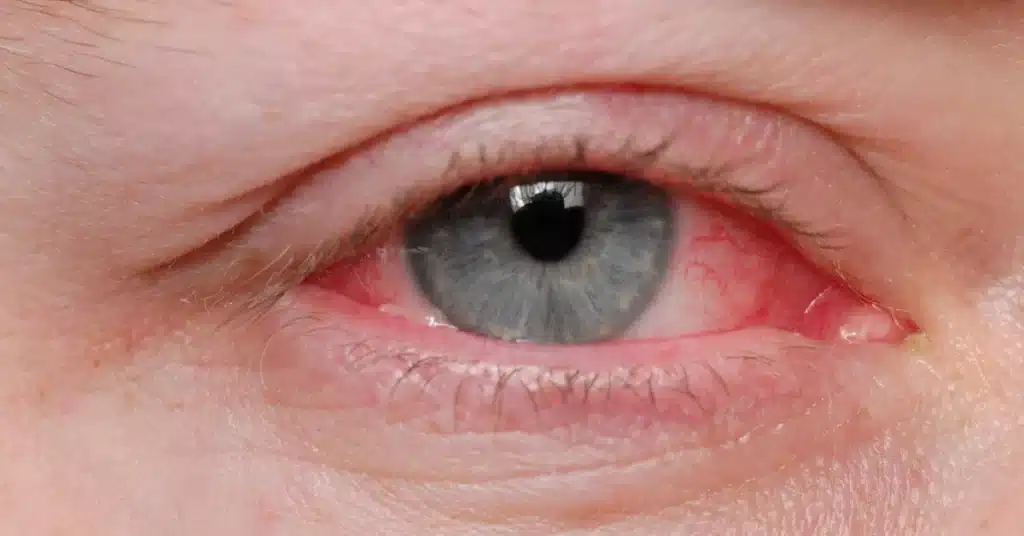The skin around the eyes is delicate, and people may often experience under-eye swelling.
It is an uncomfortable symptom that may affect one’s appearance.
Swollen eyes can result from allergies, infections, or other medical conditions.
The article explores more about swollen eyes, their causes, symptoms, and treatment options.
What is a swollen eye?
Swollen or puffy eyes occur due to fluid accumulation in the tissues under or around one’s eye.
It is a common cosmetic concern, as the skin around your eyes is thin.
Sometimes, people may also experience other symptoms with swollen eyes, like itching, discharge, and eye pain.
Most cases of swollen eyes are temporary and may go away on their own.
However, persistent cases of swollen or puffy eyes require medical treatment.
Consult an eye expert for proper diagnosis and treatment options.
Experiencing puffy eyes and want to know about it in detail? Read: A Guide on Overcoming Puffy Eyes: Types, Causes, and Remedies
Causes of swollen eyes
 Source: pixelshots
Source: pixelshotsUnderstanding the causes of eye swelling is important to select the proper treatment for the condition.
Various factors can lead to swollen eyes, ranging from minor irritations to serious health issues.
Some common causes of swollen or puffy eyes include:
Allergies: Eye allergies due to pollen, dust, or certain foods can trigger swollen eyes due to inflammation.
Sinus Infections: The infection can lead to fluid buildup and pressure around the eyes, causing them to swell.
Conjunctivitis: Pink Eye is a condition that can cause itching, redness, and eye swelling.
Eye Trauma: Injuries or trauma to the eye area, like a direct hit on the eye or surgical procedures, can result in swelling.
Crying: Increased tear production from crying can cause puffy eyes. The excess tears can cause swelling by blocking the eye drainage system and collecting around the eyes.
Eye Strain: Long use of digital devices or straining your eyes can lead to fatigue and swelling.
Lack of Sleep: Insufficient sleep can cause fluid retention around the eyes and lead to puffiness.
Underlying Health Conditions: Certain medical conditions like Graves Disease can also cause eye swelling.
Explore and understand the causes of swollen eyes in detail. Read: “Why is my eye swollen (Causes of swollen eye)”
Symptoms that accompany swollen eyes
Identifying the symptoms associated with a swollen eye is important for recognizing the proper cause of the problem.
People should watch out for the following symptoms:
- Puffiness around the eye area
- Red eye
- Eye pain
- Discomfort
- Watery eyes
- Difficulty opening or closing the eye
- Light sensitivity
- Eye discharge or crusting around the eye
- Blurred vision
- Fever (in cases of infection)
Consult an eye expert for proper medicines for swollen eyes if you experience the above symptoms.
Want to discover about the medication for swollen eyes? Read: “Medication for swollen eye”
Swollen eye remedies
 Source: pixelshot
Source: pixelshotA swollen eye is commonly a mild problem and can be treated with the help of natural remedies.
Swollen eye remedies offer cost-effective relief for discomfort and promote faster recovery.
The natural swollen eye remedies include:
Cold compress: Using a cold compress can reduce swelling and soothe the affected area. Use a cold cloth or a gel eye mask and apply gently for 10-15 minutes several times daily.
Cucumber slices: Chilled cucumber slices help reduce swelling and soothe the delicate skin around the eyes. Take cool slices and put them on closed eyelids for a few minutes.
Tea bags: Cool and damp tea bags on the eyes can help lower swelling and soothe irritation. A study states that caffeinated tea bags can help reduce fluid retention and inflammation.
Aloe vera gel: Aloe vera gel may control eye swelling by reducing inflammation and redness. Apply pure aloe vera gel around the eyes for effective results.
Proper hygiene: Maintain good hygiene practices to prevent further irritation and infection. Avoid rubbing or touching the swollen eye and regularly clean your eyelids with a gentle cleanser.
Identify and avoid allergens: Consult a doctor to identify and avoid the allergens that are triggering one’s swollen eyes. Common allergens include pollen, dust, mold, and more.
Want to learn more about natural remedies for swollen eyes? Read: “Swollen eye remedies”
How to treat a swollen eye
Persistent cases of swollen eyes require proper medical treatment.
However, the treatment of the eye swelling depends on the causes of the problem.
The doctors may prescribe antibiotics or antiviral medications in case the eye swelling is caused by an infection like Pink Eye.
However, the doctor suggests Antihistamine or decongestant eye drops if the swollen eye is due to Eye Allergy or minor irritation.
Also, various eye creams for puffiness can reduce swelling and restore sensitive eye skin.
Individuals should try products containing soothing ingredients like vitamin C, E, and ferulic acid.
Always gently use a small amount of the cream to promote circulation and drainage.
Consult an eye expert for a proper treatment plan and attend all follow-up checkups.
Explore and understand various swollen eye treatment options in detail. Read: “How to treat a swollen eye”
Key takeaways
A swollen eye is an uncomfortable symptom caused by fluid accumulation in the tissues under or around one’s eye.
The common causes of swollen or puffy eyes include allergies, Pink Eye, eye Trauma, crying, lack of sleep, and more.
It is a common cosmetic concern and may go away on their own.
However, one may experience persistent swollen eyes along with symptoms like eye pain, discharge, redness, blurred vision, and more.
Consult an eye expert for proper medical treatment like antibiotic medications, decongestant eye drops, eye creams, and more.
Individuals should get a complete eye exam to identify the proper cause of the swelling and get accurate treatment.
Frequently Asked Questions
Why is my under eye swollen?
Under-eye swelling can be caused by various factors such as allergies, fluid retention, lack of sleep, dehydration, aging, and more.
Additionally, some medical conditions like Sinusitis, thyroid disorders, or infections may contribute to under-eye swelling. One should get a proper eye exam to identify the condition’s exact cause.
How long do swollen eyes from crying last?
Puffy eyes from crying commonly last for a few minutes to hours. However, the duration may also depend on factors like individual sensitivity, emotional intensity, and other contributing factors like dehydration.
Can a child get swollen eyes?
Yes, children can experience swollen eyes due to various reasons, such as allergies, infections, trauma, or insect bites.
The parents should monitor the symptoms closely and contact an eye expert if the swelling persists or is accompanied by other symptoms like fever or vision changes.
Will a swollen eye go away on its own?
Most cases of swollen eyes are temporary and may resolve on their own. Individuals can also try natural remedies like cold compress, tea bags, and more to help with the eye problem. However, persistent cases of eye swelling require proper evaluation and treatment.
How do you prevent eye swelling?
One should avoid touching or rubbing their eyes with unwashed hands to prevent eye swelling. Also, protect your eyes from allergens and injury by wearing protective eyewear. Consult an eye expert for regular eye exams to reduce the risk of swelling.
When referencing outside resources, GoodrxMedicine always provides full citations. To learn more about the measures we use to maintain the quality of our content, please review our Content Information Policy.











